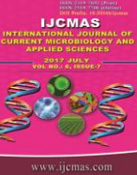


 National Academy of Agricultural Sciences (NAAS)
National Academy of Agricultural Sciences (NAAS)

|
PRINT ISSN : 2319-7692
Online ISSN : 2319-7706 Issues : 12 per year Publisher : Excellent Publishers Email : editorijcmas@gmail.com / submit@ijcmas.com Editor-in-chief: Dr.M.Prakash Index Copernicus ICV 2018: 95.39 NAAS RATING 2020: 5.38 |
Extraction of Syzygium aromaticum powder using organic solvent (methanol) revealed the existence of alkaloids, flavonoids, terpenoids, tannins, aldehydes, ketones, alkaloids, glycoside, steroids, carbohydrates and phenolic compounds. A total of forty-six phenolic compounds were identified and quantified in Syzygium aromaticum extract using GCFID among which are gallic acid (847.36), syringic acid (259.04), protocatechuic acid (252.29), caffeic acid (151.01), eugenin (121.30), eugenitin (101.29), P-hydroxybenzoic acid (85.04), salicyclic acid (31.84), kaempferol (30.75), quercetin (27.68), rhamnetin (21.61), phenylacetic acid (18.09), myricetin (16.67) and isohamnetin (5.07) being of significant values. The percentage yield of Syzygium aromaticum oil extracted by hydrodistillation technique and isolated with Dichloromethane was 21.20%. The major phytoconstituents present are eugenol (75.10%), eugenyl acetate (13.57%), β-caryophyllene (5.27%), limonene (1.45%) and α-terpinolene (1.12%) respectively. The antimicrobial activity (minimum inhibitory concentration and minimum bactericidal concentration) of Syzygium aromaticum oil was investigated against six microorganisms namely Staphylococcus aureus, Escherichia coli, Pseudomonas aeruginosa, Candida albicans, Aspergillus flavus and Penicillium spp using agar well diffusion and nutrient broth dilution techniques. Syzygium aromaticum oil showed excellent antimicrobial activity compared to ciprofloxacin and ketoconazole used as control by inhibiting both bacteria and fungi with wide zones of inhibition.
 |
 |
 |
 |
 |